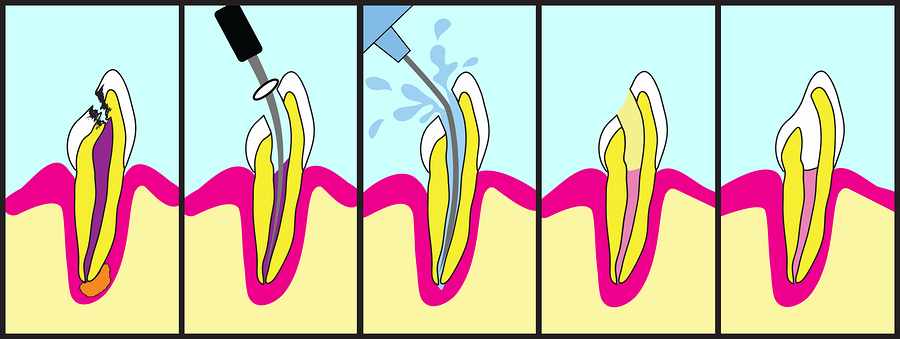Root Canal Treatment in San Jose
 What is a root canal?
What is a root canal?
A root canal is one of the most common dental procedures performed, well over 14 million every year. We routinely perform this treatment which can save your natural teeth and prevent the need for dental implants or bridges.
At the center of your tooth is pulp. The pulp is a collection of blood vessels that helps to build the surrounding tooth. Infection of the pulp can be caused by trauma to the tooth, deep decay, cracks, and chips, or repeated dental procedures. Symptoms of the infection can be identified as visible injury or swelling of the tooth, sensitivity to temperature or pain in the tooth and gums.
How is a root canal performed?
If you experience any of these symptoms, your dentist will most likely recommend root canal therapy (RCT) to eliminate the diseased pulp.
As the pulp gets damaged, it is essential to have them replaced in order to prevent the entire teeth from falling off. Here is how an RCT is performed.
This injured pulp is removed and the root canal system is thoroughly cleaned and sealed. This therapy usually involves local anesthesia and may be completed in one or more visits depending on the treatment required. Success for this type of treatment occurs in about 90% of cases. If your tooth is not amenable to endodontic treatment or the chance of success is unfavorable, you will be informed at the time of consultation and an alternative treatment such as an implant or bridge may be recommended. We use local anesthesia to eliminate discomfort. In addition, we will provide nitrous oxide analgesia if indicated. You will be able to drive home after your treatment, and you probably will be comfortable returning to your normal routine.
What happens after treatment?
Oftentimes, after your root canal therapy has been completed, the tooth will require a crown in order to protect and strengthen it. It is rare for endodontic patients to experience complications after routine endodontic treatment. If a problem does occur, however, we are available at all times to respond. To prevent further decay, continue to practice good dental hygiene.
Office Hours
MON - THU 8:00 am - 5:00 pm
FRI By appointments only.
SAT - SUN Closed
 What is a root canal?
What is a root canal?










